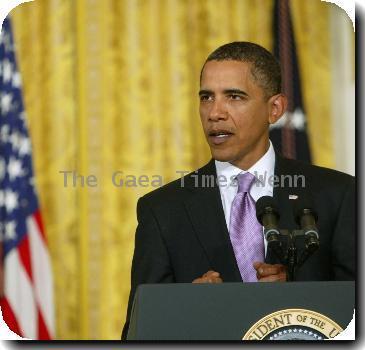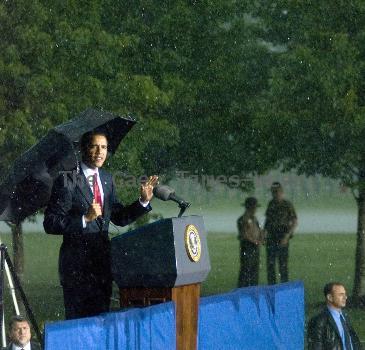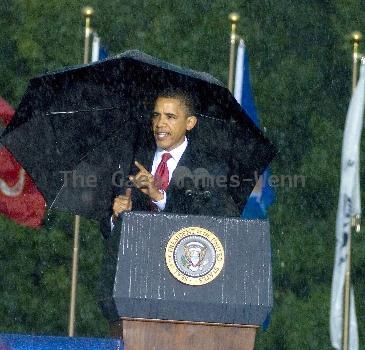Spreading slick stains beaches, tourists while cap collects fraction of oil
By Melissa Nelson, APSaturday, June 5, 2010
Oil stains beaches and tourists as slick spreads
PENSACOLA BEACH, Fla. — Driftwood and seashells glazed with rust-colored tar lined the surf along the Gulf Coast’s once-pristine white sand beaches Saturday, the crude from a busted oil well deep underwater showing up in greater quantities and farther east.
A cap placed over the gusher was collecting some of the oil, which had stained beaches with a waxy mess of tar balls and created an unusual orange foam in the surf.
In Gulf Shores, Ala., wooden boardwalks leading to beachfront hotels were spotted with oil from beachgoers’ feet, and some condominiums were providing solvents for guests smeared with the brown goo. At Pensacola Beach, the retreating high tide left an orange stain in its wake.
Erin Tamber moved to the beach area after surviving Hurricane Katrina in New Orleans, where she had lived for 30 years.
“I feel like I’ve gone from owning a piece of paradise to owning a toxic waste dump,” she said as she inspected the beach Saturday morning.
President Barack Obama pledged Saturday in his weekly radio and Internet address to fight the spill with the people of the Gulf Coast. His words for oil giant BP PLC were stern: “We will make sure they pay every single dime owed to the people along the Gulf coast.”
Six weeks after an April 20 oil rig explosion killed 11 workers, BP has failed to significantly stem the worst spill in U.S. history. The government’s point man for the crisis, Coast Guard Adm. Thad Allen, said at a news briefing Saturday that the cap collected about 252,000 gallons of oil Friday, its first full day of use.
The device, resembling an upside-down funnel, was lowered over the blown-out well a mile beneath the sea to try to capture most of the oil and direct it to a ship on the surface. BP officials are trying to strike a delicate balance by capturing as much oil as possible without creating too much pressure or allowing the build-up of ice-like hydrates, which form when water and natural gas combine under high pressures and low temperatures.
Hydrates foiled an earlier containment box because the slushy mixture clogged pipes and threatened to make the massive box float away.
The trick for BP is achieving the right balance of pressure so oil will come to the surface without spewing out of a rubber seal between the cap and a sheared-off riser pipe. Allen compared the process to trying to stop the flow of water from a garden hose with a finger.
“You don’t want to put your finger down too quickly, or let it off too quickly,” he said.
The goal is to gradually raise the amount of the oil being captured, Allen said. The device’s daily capacity is 630,000 gallons, and officials estimate oil is gushing out at a rate of about a half-million to a million gallons a day.
The well has leaked 22 million to 47 million gallons since the crisis began, according to government estimates. The widening scope of the disaster deepened the anger and despair just as Obama arrived for his third visit to the stricken Gulf Coast.
On Obama’s trip to the Grand Isle on the Louisiana coast, his motorcade passed a building adorned with his portrait reminiscent of posters of him during his presidential campaign. Instead of “hope” or “change,” the words “what now?” were on his forehead.
The oil has reached the shores of Louisiana, Mississippi, Alabama and Florida. It has turned marshlands into death zones for wildlife and stained beaches rust and crimson. Some said it brought to mind the plagues and punishments of the Bible.
“In Revelations it says the water will turn to blood,” said P.J. Hahn, director of coastal zone management for Louisiana’s Plaquemines Parish. “That’s what it looks like out here — like the Gulf is bleeding. This is going to choke the life out of everything.”
He added: “It makes me want to cry.”
As the operation went on at the bottom of the Gulf of Mexico, the effect of the BP spill was increasingly evident.
Swimmers at Pensacola Beach rushed out of the water after wading into the mess, while other beachgoers inspected the clumps with fascination, some taking pictures.
Health officials said that people should stay away from the mess but that swallowing a little oil-tainted water or getting slimed by a tar ball is no reason for alarm.
On Saturday morning at a public beach in Gulf Shores, a long line of brown globs marked the high water line from overnight at the public beach.
“This is disgusting,” said Macon Srygley, of McCalla, Ala. “I hate it for BP, but this has to be a lesson for anyone drilling in the ocean. We’ve got all this technology, but are we not smart enough to realize we can end ourselves with it?”
A total of 527 birds have been found dead from Texas to Florida since the start of the oil leak, according to a federal tally released Friday. The exact cause of death was not immediately known for all the birds, although more than three dozen were visibly oiled.
Authorities said 235 sea turtles and 30 mammals have also been found dead.
Allen planned to meet later Saturday with Alabama Gov. Bob Riley, who has criticized Coast Guard decisions to send boom from Alabama to Louisiana and said he will consider closing beaches if the oil becomes a health threat. Oil hit Alabama before the boom could be returned, angering Riley and raising questions about Coast Guard management.
“It’s like a battle; you have to move your resources,” Allen said in an interview. “You don’t always get it back in time, but you do your best.”
BP CEO Tony Hayward assured investors that the company had “considerable firepower” to cope with the severe costs. Hayward and other senior BP executives struck a penitent note in their first comprehensive update to shareholders since the explosion, promising to meet its obligations related to the spill.
Contributing to this report Associated Press writers Greg Bluestein in Grand Isle, La.; Eileen Sullivan in Washington; Paul J. Weber in Houston; Ray Henry in New Orleans; and Jay Reeves in Theodore, Ala.
Tags: Accidents, Alabama, Barack Obama, Coastlines And Beaches, Environmental Concerns, Florida, Louisiana, New Orleans, North America, Pensacola, Pensacola Beach, United States







